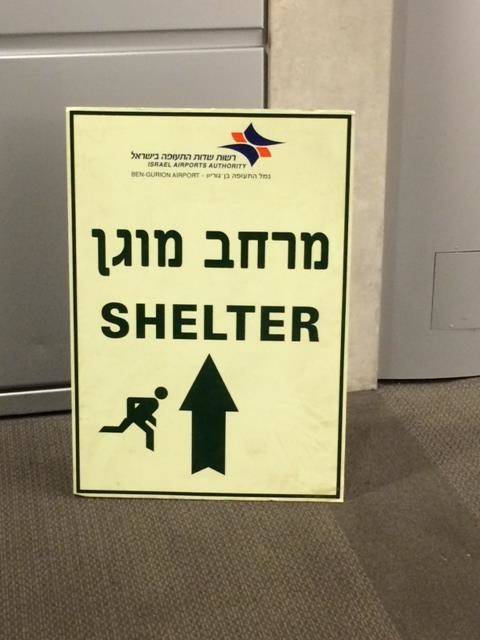Local rabbi reports from mission in Israel
Rabbi Mark Greenspan has been the spiritual leader of the Oceanside Jewish Center for over 15 years, and is considered “unofficial rabbi” of the Friedberg Jewish Center. While vacationing in New England with his wife Marilyn last week, he heard about a Rabbinical Assembly solidarity mission to Israel, in the wake of renewed hostilities in the Middle East. He immediately signed He immediately decided to join the mission.
Rabbi Greenspan shared his story with The Herald. The first part, written upon arrival in Israel, follows. Please visit www.liherald.com for the rest of the four-part series.
July 20, Tammuz —We are flying at 33,000 feet — about the same altitude as the Malaysian plane that was shot down last week. I am among a group of Conservative Rabbis flying to Israel to visit border communities upon which missiles are falling daily. Crazy —absolutely. I am certain that our planners will do everything to keep us out of harm’s way but how much can they do to cheat fate or warfare?
The decision to visit Israel came about in the last five or six days. Marilyn and I were in the White Mountains of New Hampshire on a brief vacation. With every stop we were checking the news or our iPhones to learn what was happening in Israel, and around the world for that matter. Things have gone from bad to worse with the downing of a jetliner and the escalating hostilities in Israel. We felt helpless. And then a notification came from the Rabbinical Assembly of an “emergency mission” to Israel. I knew immediately that I had to go; I was already feeling bad about not being able to visit Israel this summer. Now there was a need to stand with the Israelis.
Am I selfish to go at a time like this? What difference will my presence make? We want to believe that the people of Israel need our solidarity in times of crisis but, honestly, do they really need our presence?
But here I am, not quite sure why but feeling deep in my kishkes that this is where I need to be. I need to be in Sderot and Ashkelon. I need to stand at the graves the three boys who were abducted and killed by Hamas. I need to see the people I care about in Israel right now and say to them, “I am standing with you.”
I remember visiting Israel on a similar mission just before the Gulf War and literally days before the missiles fell on Tel Aviv. So many Americans showed up on solidarity missions that Israelis started saying “Tov she-batem; matai atem borchim?” Or, “It is good that you came – when are you rushing off?” There is something disingenuous about showing up and standing on the sides lines at a time like this.
But I want to hear the sirens as I did so many years ago on the eve of the Yom Kippur War. And I want to sit in the shelters with those who do so every day, even if it is only for a few days. And I want to understand what this land means to me or what it should mean to me. I feel deeper and deeper with each passing day that my life has passed by and with it the opportunity to be part of this grand experiment. So complex, so painful, so tragic — but it is the piece of history that could have been mine and I chose not to embrace. And with all that I know — how complicated its history is — I wish I could figure how to make that happen.
But there was always a reason why not: our parents, our family, my work, and now our children. They are all good reasons, but I wonder how history will judge us for not being part of the Zionist experiment.
Two former Oceanside Jewish Center kids stopped by our home to talk with me on Shabbat afternoon. One has become dati (religiously observant) and is serving in the army, the other just returned from Birthright and is bubbling with excitement about going back to Israel so she can spend some significant time there. I look at my own regrets and wonder what I should say to them.
So maybe, coming in the hardest of times will answer some of these questions. Maybe our presence will make some kind of a difference for Israel in some small way.
I am going to Israel with dread — not knowing what to expect, what to anticipate. And maybe the worse dread is that nothing will happen, that this will just be another trip.
A colleague told me he has been to Israel 69 times. I remember what former president Yitzhak Navon said in response to an American Jew who bragged about coming to Israel many times: “Why don’t you come just once?” We American Zionists hop back and forth, never quite sure where we belongs.
I want to find answers, this time.
Walking off the plane into the airport, one of the first things I notice is a sign signifying a shelter. It is not an auspicious beginning to our visit.

 63.0°,
A Few Clouds and Breezy
63.0°,
A Few Clouds and Breezy 




